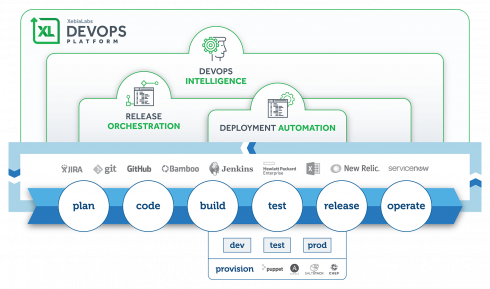
Software teams implement DevOps in different ways whether they’re starting from scratch or transitioning from Waterfall practices. Also, what works for small teams doesn’t tend to scale well, especially in large enterprises building and maintaining different types applications. XebiaLabs enables DevOps at any scale so software teams have the flexibility they need to use their favorite tools and methodologies while the enterprise gets the visibility, reporting, analytics and auditing capabilities it needs.
“It’s relatively easy for a small DevOps team to succeed, but scaling that success can be really challenging,” said Tim Buntel, VP of Products at XebiaLabs. “We allow you to take all the great work being done by the community and leverage DevOps at enterprise scale.”
Gartner’s recent Application Release Orchestration (ARO) Magic Quadrant the Forrester Wave for Continuous Delivery and Release Automation (CDRA) both recognize XebiaLabs as a leader.
“Industry analysts consider this category critical for scalable enterprise software delivery,” said Buntel. “We’re very pleased they’ve responded so positively to our products over the years.”
Equally impressive are what large enterprises are able to accomplish with XebiaLabs. For example, multinational banking financial services company Societe Generale reduced its software delivery cycles by 45% while lowering operating costs by 10%. Satellite company Digital Globe reduced the time it takes to launch a satellite from three years to one year. Meanwhile, GE Power Systems reduced the cost of delivering software to production by 45% in less than six months. Other customers include Bank of America, Toyota and TD Bank.
And, following a year of 100% growth, XebiaLabs just received $100 million in Series B funding.
Orchestrate DevOps across the enterprise
Enterprise and individual software team requirements shouldn’t conflict, but they often do. Different software teams use different tools which can prevent the enterprise from getting the breadth and depth of visibility and tracking capabilities it needs.
“Teams should be able configure their own process in a way that suits them but you also need enterprise controls as you scale,” said Buntel. “It’s like an orchestra where you’ve got a lot of expert musicians but you still need a conductor who can see the big picture and get the best performance from each of them.”
To enable that, XebiaLabs complements whatever tools and architectures individual teams use while enabling a consistent approach to DevOps. Without an orchestration layer, a lot of time and money is wasted.
“If scaling DevOps was as simple as just buying a couple of products, we’d have that covered. Because of the complexity, it’s very difficult to get all of those tools working together smoothly,” said Buntel. “We complement all of your existing tools and can coordinate any combination of them, so no matter what you use for a CI, Agile planning, change management or automated testing tools you’re using and no matter what kind of platform you’re using, XebiaLabs can accommodate all of the different combinations.”
Similarly, XebiaLabs supports the breadth of application types from monolithic Java applications that rely heavily on traditional SQL databases to 100% cloud-native serverless AWS Lambda functions with API endpoints that have no SQL backend. The flexibility allows organizations to evolve their tools and processes at their own pace, as well as adopt new tools, processes and methodologies with higher levels of confidence.
“A lot of our customers start with a mix of automated and manual processes. As they automate more processes, we can support that, so a task that was manual but is now automated fits in the same kind of pipeline architecture,” said Buntel. “We consistently reduce friction as your DevOps capabilities mature and technologies, architectures and processes evolve.”
Unify all stakeholders
Software stakeholders are technical and non-technical in large enterprises. If the entire DevOps process is written in scripts, it’s hard to translate that into something meaningful which non-technical and less-technical stakeholders can use to provide value.
“If you’re in a tiny startup with a two-pizza team, generally, all of the folks involved tend to be fairly technical, so they can all script things up and understanding what everyone else is doing,” said Buntel. “As you scale, the challenge is trying to achieve a common understanding when you also have to involve business owners, testers, regulatory and compliance specialists and security professionals.”
With XebiaLabs, enterprises don’t have to make trade-offs. Its ease of use makes it accessible to anyone regardless of their skill set. At the same time, developers can maintain continuous delivery pipeline components as code artifacts.
Learn more at www.xebialabs.com.





